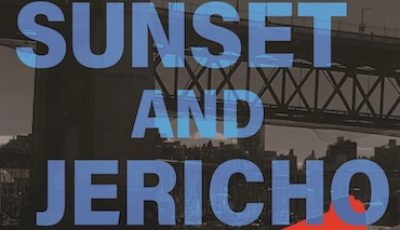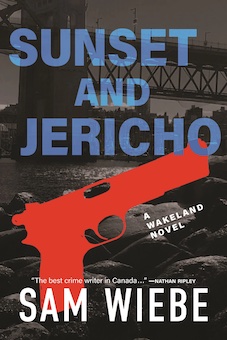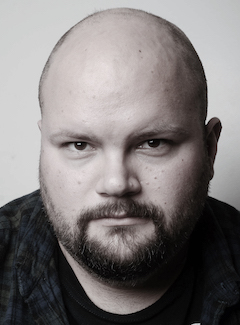

Latest Books Sunset and Jericho by Sam Wiebe
 The mayor’s brother is missing. A transit cop lies beaten and blinded, her service weapon stolen. A new series of graffiti tags are appearing, linked to an underground group calling themselves The Death of Kings. Class warfare has broken out on the streets of Vancouver, and PI Dave Wakeland finds himself on the front lines―but unsure which side he’s on.
The mayor’s brother is missing. A transit cop lies beaten and blinded, her service weapon stolen. A new series of graffiti tags are appearing, linked to an underground group calling themselves The Death of Kings. Class warfare has broken out on the streets of Vancouver, and PI Dave Wakeland finds himself on the front lines―but unsure which side he’s on.
Reeling from a bad breakup, and increasingly alienated from the city he calls home, Wakeland nevertheless agrees to look for the missing gun. The investigation takes him from flophouses to city hall, and from a clinic in the West Vancouver hills to a mega-mansion in the exclusive British Properties neighborhood―along the way, crossing every ethical line the PI has drawn for himself. Even then, Wakeland may not be able to pull it off.
“Dave Wakeland is back; battered, shot, soul-sick and heartbroken, and as tenaciously single-minded as ever in the pursuit of evil…he might be tired of it all, but his fans will be enthralled. Wiebe is the absolute master of noir with heart. Wakeland had better not be planning to quit, because as far as I’m concerned, when you’re tired of Wakeland, you’re tired of life.” – Iona Whishaw, bestselling author of The Lane Winslow Mystery series
“Sam Wiebe is one of the most respected names in crime fiction today and with good reason. SUNSET AND JERICHO, the latest entry in the Wakeland series, is a gritty, realistic urban noir that examines the problems so prevalent in cities around the world today. With pacing that doesn’t let up, and a shocker of an ending, readers won’t be able to put this one down.” – Robyn Harding, bestselling author of The Perfect Family
Sam Wiebe recently spent some time with The Big Thrill discussing his latest thriller, SUNSET AND JERICHO.
Can you pinpoint a moment or incident that sparked the idea for this book?
The chief inspiration was a billboard which went up across the street from my dank, ground floor, junior one bedroom apartment in East Van. The sign said YOU DON’T NEED A MILLION.
It was, I felt, a condescending, haughty, and disingenuous spin on the real estate crisis. You don’t need a million dollars to live in Vancouver, only a paltry eight or nine hundred grand. It was clueless and offensive and posted next to a major transit hub where working people would see it as they headed to the bus each morning. There was something hopeless about that crisis, knowing you can’t afford to live in a place, watching a great many of your friends and contemporaries leave. And it exacerbated Vancouver’s other attendant social problems. And still does.
So what happens when young people strike back, try to hold the wealthy accountable? That was the genesis of SUNSET AND JERICHO.
A novel is such a major undertaking; there’s the writing of it, of course, then you’re spending months and months revising, polishing, and then promoting it. How did you know this was the book you wanted to spend the next couple of years on?
I began writing the novel in early 2018. My father died that March. Rather than abandon the book, I clung to it. I built mornings around writing it, sometimes successfully parking grief to immerse myself in the characters for a few hours. Sometimes I could only do the best I could.
I finished it, and there it sat, first draft completed but unread, for a couple of years. I didn’t glance at it. I didn’t edit it. I was a little afraid it would be incomprehensible, or so suffused with grief it would read as a shriek on the page.
When I finally did read the book, I was generally pleased with it. I revised it for the better part of a year. The mystery element is complex, with two murders sharing suspects and clues but not geography. I feel it’s the best pure mystery I’ve written.
Working in spite of grief, I think, can be a way to live in spite of grief.
My dad was a musician, and we’d discuss art and the artist life sometimes. Our last talk, I was moaning about typical writer gripes—lack of promotion and support, money troubles, etc. He said “It’ll be interesting to see how you deal with that.” Which I took to mean, we all know there’s no answer other than to trudge forward, so just keep going. It’s the most honest advice you can give someone.
When you first created your protagonist for this book, did you see an empty space in crime lit that you wanted to fill? What can you share about the inspiration for that character?
There’s a romance to the detective genre other mysteries lack. A celebration of of language and wit, of human diversity and extremes in human nature. There’s a connection to daily life in the city, usually, but life anywhere. I love the genre.
And Wakeland is a part of that. He likes a drink, he likes music, he likes moody introspection, and he’s competent with his fists when backed into a corner. He responds to vulnerability, looks for truth, believes in love, and despises cruelty and hypocrisy. He leaves himself open to be hurt, but instead of closing up, absorbs it and keeps going.
But he’s never only those things. Wakeland operates in the present day—in a postcolonial, postindustrial, multivalent world. He’s of that world and he functions in that world. Which means instead of being a loner with a shithole office, he sometimes works in a corporate-friendly office environment, with a business partner who understands that world. As tough as Dave is, he comes up against people who train in MMA, carry modified assault weapons, people who don’t recognize acknowledge a shared humanity or don’t care. He’s frequently outmatched.
SUNSET AND JERICHO starts with Wakeland alone, with Sonia having moved to Montreal for her career, and the Wakeland & Chen office stricken with the flu. Dave turns down a chance to work for the mayor, instead doing a favor for Ryan, chasing down a gun stolen from a transit cop who was nearly blinded in an attack. This gun connects him to the murders of a young radicalized working class guy, and the mayor’s brother.
It’s a book that leads Wakeland through a series of moral crossroads. His relationships to others have never been more critical–and he’s never been more desperately alone.
In addition to a great read, what do you hope readers will take away from this story?
The villains in the story are driven by social issues which affect a lot of people, myself included–gentrification and housing, the overdose crisis. For the first time, Wakeland has more in common with the people he’s after than with his rich and privileged clients. That sense of being fed up, of dealing with a “broken city,” is something I think people can relate to. What does justice mean in 2023?
There’s a generational divide in the book as well. Wakeland is caught between younger, angrier people and the older and wealthier. Many adults, I think, feel trapped between generations who aren’t so much speaking to each other as past each other.
The Wakeland series is a social history of Vancouver, and I hope gives voice to these concerns.
Sam Wiebe is the award-winning author of the Wakeland novels, one of the most authentic and acclaimed detective series in Canada. His latest, Sunset and Jericho, comes out April 2023. His work has won the Crime Writers of Canada award and the Kobo Emerging Writers prize, and been shortlisted for the Edgar, Hammett, Shamus, and City of Vancouver book prizes.
To learn more about the author and his work, please visit his website.
- Africa Scene: Iris Mwanza by Michael Sears - December 16, 2024
- Late Checkout by Alan Orloff (VIDEO) - December 11, 2024
- Jack Stewart with Millie Naylor Hast (VIDEO) - December 11, 2024

